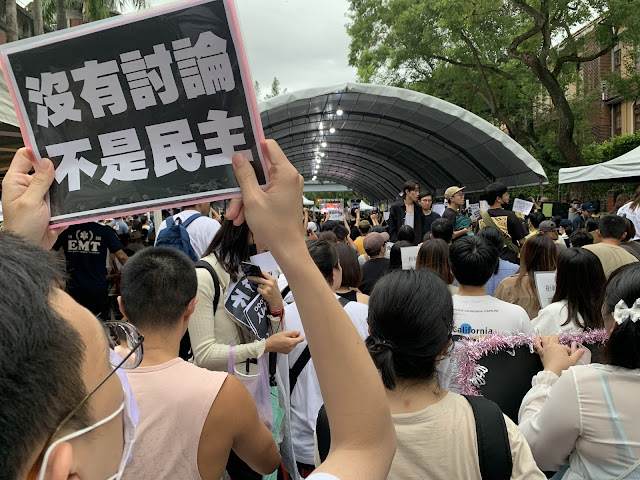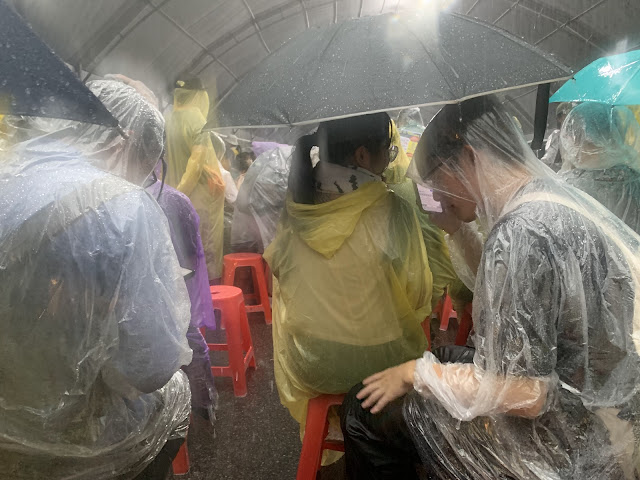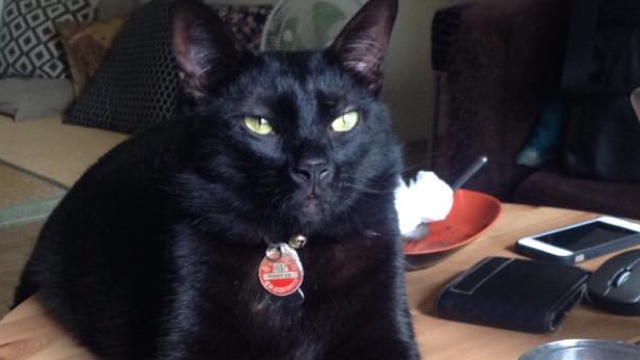There are a variety of issues I want to talk about, all of which deserve a short post. All of them, however, are immediately important in my opinion. So, let's go with one big post. The end goes a little off the rails but there are trash bags and fake Chinese poetry there for you to enjoy.
The KMT is trying to bribe you
The KMT-led legislature, along with their TPP lapdogs, have just passed an NT$10,000 tax rebate for every citizen. It's unclear of foreign spouses and permanent residents will be included -- this is often decided later and, despite being taxpayers, we sometimes are (as with the COVID vouchers and NT$6,000 surplus cash back) and sometimes aren't (as with the 2008 rebate).
This comes after debate over the proposed national resilience budget and Taipower grant (more on that later). The KMTPP -- Huang Kuo-chang in particular -- have expended a lot of energy screaming about "high taxes" under the DPP (taxes aren't high) and that the DPP budget proposals were bloated (with the legislature initiating deep cuts while calling it "returning money to the people").
The KMTPP's budget cuts were a major catalyst of the recalls that are creating a mini-election season in Taiwan, so of course now they want to add goodies into the budget that bloat it right back up, right after blaming the DPP for over-spending and over-taxation.
Basically, the KMTPP doesn't know what it wants, except to not be recalled. There is no clear direction or agenda: either the DPP's budget sucks and needs to be cut, or oh no, please don't recall us, here's NT$230 billion extra in the budget so you can all have some money. It's not vote-buying, it's a tax rebate because the DPP is bad, see? We're spending money because they spent too much money, or something!
From Taiwan News:
The DPP also accused the Kuomintang of using the promise of a tax rebate to try and fend off recall votes targeting 26 of its lawmakers. The opposition defended its addition of the tax rebate to the bill by pointing at the tax surplus of NT$1.87 trillion accumulated over the past four years.Cool, so -- um, quick question. More of a comment than a question really. If we have that big a surplus, then why were you so adamant before that the DPP budget needed to be cut?
They give reasons for the rebate, but none of them make much sense. I can't find a linkable source, but apparently one idea was to take it from the national resilience budget. As a friend remarked, "great, that'll pay for two months of jiu-jitsu classes which will be super helpful if I have to fight the PLA in hand-to-hand combat."
Another reason given are the Trump tariffs, saying that these rebates are needed for economic relief. Maybe, but Trump's rhetoric is notoriously unreliable. Shouldn't we have a clearer picture of how tariffs may impact Taiwan before we add NT$230 billion to the budget?
Huang Kuo-chang (黃國昌), whom I can't believe we all once thought was a great orator (what?) said this (translation mine):
If we follow the DPP’s logic, then weren’t Tsai Ing-wen (蔡英文) and Su Chen-chang (蘇貞昌) also wrong when they said they wanted to issue cash rebates in 2008? The DPP’s current standard is that taxpayers’ money is [their] money. It can only be given out of the DPP says so. If the DPP says it should not be distributed, then it can't be. If this is not dictatorship, then what is?Excuse me, but...what? First, weren't the 2008 rebates a Ma Ying-jeou thing? Am I missing something here? Since when were they Tsai and Su's idea? How does that equate to tax rebates only being given out when the DPP supports them?
The DPP did give out stimulus vouchers and tax rebates when they were the ruling party because, well, they were the ruling party. Of course they could pass something like that. How is that dictatorship?
Regardless, those were given out in the midst of a global financial crisis. Does Huang want to remind Taiwanese voters that they get money when the economy sucks, right after the KMT were the ones to insist on deep budget cuts? Does he really think the DPP only opposes the rebate because it wasn't a DPP idea? It's NT$230 billion, when we're not quite in an economic crisis (yet).
As for what is and isn't a dictatorship, here's a primer: a dictatorship is when the people in power stay in power, and there are no elections to choose or change leadership. If there is a change in leadership, it's done by those already in power, or it's a coup, not an election. Generally speaking there are limits on freedom of speech and other human rights.
Taiwan is about to have a round of voting. Some legislators up for recall will likely survive it, others will have to step down. Then the respective districts who chose to recall their representatives will vote on new ones. Some will likely vote in another KMT candidate, not a DPPer. The legislature might tip green, or it might not. Either way, the people choose.
In 2028, there will be another election. There's a reasonable chance the KMT will win it.
Through all of this, the KMT and TPP are free to say just about anything they want in speeches, rallies and anti-recall campaign signs. They control the legislature, for now.
So no, the DPP is not a "dictatorship". I would have thought Huang would have understood the definition of that term as he was once a professor, but it seems not.
Is Huang Kuo-chang even okay? Perhaps he should see a doctor?
There's enough money for tax rebates, but not for Taipower?
Taipower is perpetually low on funds, and there are questions over how their budget is used. I doubt they run a highly-efficient organization; both they and Taiwan Railway are somewhat notorious for doing quite the opposite. They spend a lot of money as infrastructure ages despite long lists of people on the payroll.
The KMTPP, however, is adamant on rejecting an NT$100 billion grant for Taipower in the budget. There was some talk of approving it, but as of today, it seems the provision did not make it through.
I suppose we'll need to get ready for summer blackouts and the KMT, who rejected the funding, blaming the DPP for them.
I'm not sure, however, that denying them funding is going to fix either that, or Taiwan's power grid issues. Utilities in general, including electricity, are quite low-cost for consumers. Perhaps they're too cheap, and higher rates would force more circumspect consumption. There is, however, a floor of how little power one might consume, especially in increasingly hotter weather, and with inflation creeping up and pay not keeping pace, I would imagine many people simply don't feel they can afford to pay more for utilities.
Because of this, and the fact that Taipower is a government concern, whether or not utility prices should rise is a perpetual political issue. Voters obviously don't want to pay more, so politicians don't want to approve price increases. Nobody thinks it's well-run, but it's difficult to restructure. But then it never quite has enough money, and the party in power gets blamed for strain on or failure of the grid.
I have no idea how to fix this, and I don't think full privatization would make it much better. Look at the US grid, which is mostly (entirely?) privately-owned. It's falling apart; it's absolute chaos, and there will almost certainly be a tragic large-scale failure at some point. Electricity prices sure are high though!
The KMT's take on the recalls is...a take
The KMT held a press event the other day to discuss their position on the recalls. You'll be shocked to hear that, as their own recall push failed so spectacularly that someone put their own dead mom on the petition, they are unhappy.
Here are some choice quotes from Thompson Chau's piece in Nikkei:
At the same briefing, KMT official Tony Lin called the no-confidence votes a "threat" to Taiwan's democratic system. "We're against Lai Ching-te's dictatorship," he said.So, when you do recalls it's acceptable -- and you've tried twice now -- but when the DPP does it, it's "a dictatorship"?
Oh Tony, do we need to review the definition of "dictatorship" is, like we did with Professor Huang? It usually doesn't include people voting, nor does it include you being free to call the current leader a dictator and openly speak of opposing them.
You know what can be defined as a dictatorship? The thing your party did from 1945 to 1996 in Taiwan, if we define "elections" as including a presidential election.
Get in touch, Tony. I'll gift you a dictionary. It's on me, seeing as the KMT is such a walking disaster that it probably can't afford its own. I'll even buy two: one for you, and one for Huang Kuo-chang.
KMT Chairman Eric Chu also branded the no-confidence votes "a disgrace to Taiwan's democracy," and accused the president of acting like Nazi dictator Adolf Hitler, remarks that drew backlash from foreign diplomats in Taipei in May.Oh shit I guess I gotta buy three dictionaries. I'd say you can share but I don't associate the KMT with sharing much of anything.
Again, though, was it not a "disgrace to democracy" when the KMT and their allies did them? The current recall initiative is mostly through civic groups, though of course the DPP is encouraging them and if anything, surprised by the strength of the public's positive reception. Furthermore, the KMT and allies have tried more than once to use the current, perhaps overly lax, recall regulations to take down pan-green legislators. In the latest instance, they broke the law several times trying to go after the DPP. And not just civic groups allied with the KMT -- senior KMT officials themselves have been indicted.
I guess the KMT thinks it's fine to break the law to get what they want because they spent so many decades as dictators, even though the apparently don't know what the word means.
It gets worse:
When asked by reporters whether the KMT would reconsider its China policy in light of the recall campaign, Vice Chairman Andrew Hsia said the party would stand by its core position that Taiwan is part of a broader Chinese polity.
"We will be following the constitution -- which is a 'One China' constitution -- and we will be following the 1992 consensus," Hsia said in a briefing, referring to the understanding reached under former President Lee Teng-hui that acknowledged each side's existence.
Okay, so, you hate the recalls, and you hate that the public doesn't seem to like you very much, and you hate that you lost the last presidential election and didn't quite win the legislative one, but you are completely unwilling to re-think the main party platform that has caused you such difficulty with voters? The main reason why they dislike you in roles of national governance? And the main reason why, every time they give you a chance, you fuck it up?
It's almost as though forcing Chinese identity on all Taiwanese is the core reason for the KMT's existence, and if they give it up in favor of a pro-Taiwan approach, they'll lose the only thing that differentiates them from the DPP. Huh.
Chau's a great reporter though. He rebuts the idea that the ROC constitution is "one China":
The notion that the constitution endorses the "One China" concept is a subject of considerable debate in Taiwan. Professor Hsu Tzong-li, formerly Taiwan's chief justice, has argued that a 1991 constitutional amendment redefined the two sides of the Taiwan Strait as "two Chinas" engaged in "state-to-state relations."
On Wednesday, Hsia reiterated that both sides believe in the "One China" notion. "To Beijing, it's the People's Republic; to Taipei, it's the Republic of China," he said.
He could have also pointed out that the 1992 Consensus wasn't a consensus at all, but this is still fantastic. His boilerplate is also acceptable:
China claims Taiwan as part of its territory.Succinct and true, and the context of the rest of the article clarifies that Taiwan is sovereign.
It's worth mentioning that regardless of what Hsia insists, every elected president of Taiwan except for one has called Taiwan a "country", and neither president since Ma Ying-jeou has endorsed the notion that the "Republic of China" has a claim on any territories beyond it currently governs.
Hsia is terrible at making a good point:
Hsia, who served as a senior diplomat and later as minister for China affairs under KMT President Ma Ying-jeou, defended the legacy of his former boss.
For eight years under Ma, Taipei and Beijing had "a stable, peaceful, prosperous cross-strait relationship," Hsia said. He pointed to Taiwan's attendance at international meetings at the time and the signing of trade deals with Singapore and New Zealand as proof of Ma's diplomatic credibility.
Yeah, because Ma was a unificationist and the CCP liked that, so they talked to him. He was actively and intentionally readying Taiwan for unification with China. It wasn't "peaceful" dialogue between two sides, it was capitulation. Besides, the DPP had been perfectly able to hold peaceful dialogue with China, until the KMT collaborated with the CCP to actively undermine them.
And now for some fun recall bits
This building on Minquan East Road is a battleground both for and against the recall of Wang Hung-wei (王鴻薇), who is a word nobody should call a woman, but she is one nonetheless. The top billboards support her recall, while the blue and yellow ones oppose it:
You might disagree with what the cartoonish larger billboard has to say about Wang, though I'm not sure why you would. It's basically calling her a CCP collaborator, which is what she is. It's not even the only thing that makes her a terrible person!
At least that billboard makes a case for recalling her. The smaller ones from her supporters don't say anything at all except "come vote against the recall", "don't agree" and "support Wang Hung-wei" -- which isn't an argument. Can they not otherwise defend her?
In other news, New Taipei legislator Chang Chi-lun (張智倫) apparently handed out trash bags as free gifts to voters. Chang's district is traditionally deep blue, but he's facing recall.
This is objectively hilarious. Also, Chang doesn't look much like his photo, which is common in Taiwanese politics.
It's such a dumb choice of gift -- practical, but the pink color given that he's an accused CCP collaborator and the fact that it's a trash bag both send the wrong message -- that I actually checked to make sure it was real.
In honor of Chang's choice putting a smile on my face, I wrote some fake classical Chinese proverbs for you (and had the first one checked by a friend). Let's start with Li Bai:
全世界最奇怪的
就是垃圾自備垃圾袋
-- 李白
We can't forget Sun Tzu:
如果你的想法不好,
不管你的樣子看起來什麼樣,
把自己像垃圾袋一樣呈現給世界,
光滑的塑膠面
隱藏裡面的東西。
-- 孫子
Finally, we have Du Fu, although this one hasn't been checked by a native speaker:
時代落日
山河綠
古代皇帝就像
他們帝國的殘骸
黃昏粉紅色光芒
-- 杜甫
Anyway.
Wang and Chang are both in blue districts. I think Chang's is deeper blue, as the DPP regularly runs strong candidates in Wang's, which means they think they can flip it, but it's also never gone green since its inception. Fun fact: one of its former legislators was Taipei mayor Chiang Wan-an's (蔣萬安)'s father, John Chang/Chiang, who is legally considered to be the son of former dictator Chiang Ching-kuo (蔣經國).
Anyway, there's a reasonable chance that if they are recalled, another KMTer will be elected in their stead. I think Wang is more likely to be voted out than Chang, because her district seems like more of a battleground, and she's far more public of a shambling mess. I don't know much about Chang, though.
My main concern with these blue districts is not that a KMTer will take the place of whomever might be recalled. In fact, perhaps it will scare the KMT into better behavior, at least for awhile.
Instead, I worry that they'll elect someone who seems better-behaved on the surface, more humble, doesn't exude drama and mess, isn't obviously a CCP collaborator...but who totally is, because the KMT has decided to throw its lot in with the CCP, and the CCP is happy to help get collaborators elected.
It'll be harder to spot, though, because they'll have learned to keep it down. Then we have to fight that, and be called delusional for thinking these new collaborators are doing anything wrong, and around and around it goes.

































